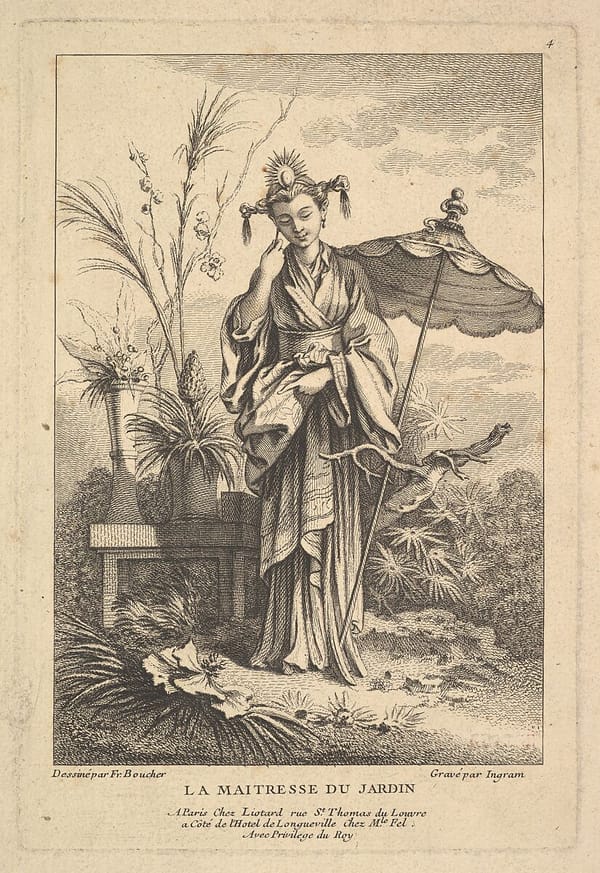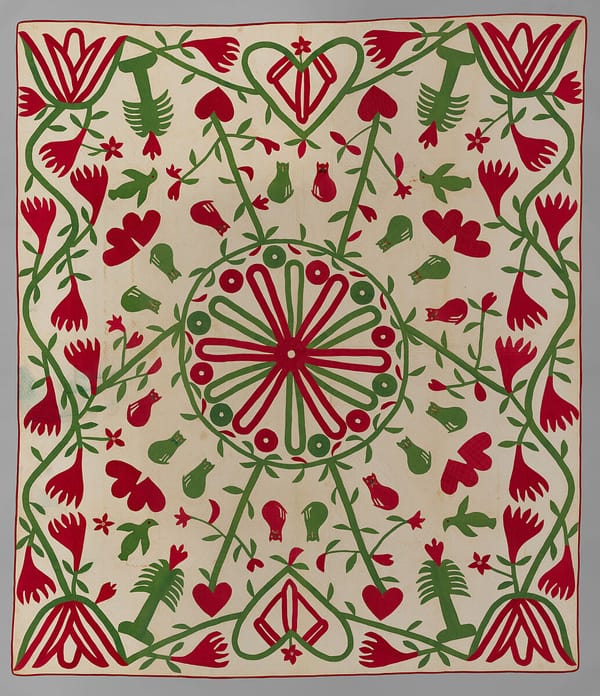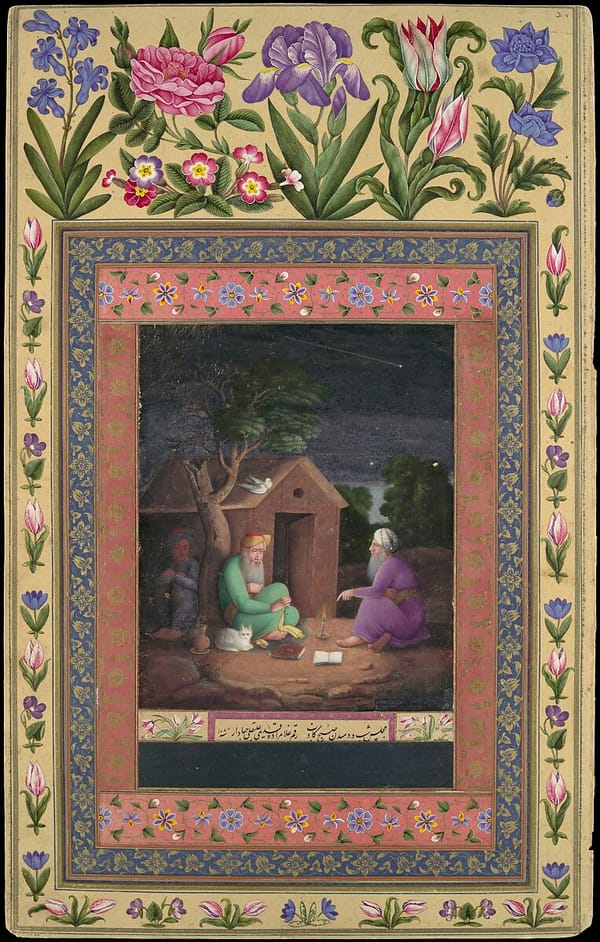Issue 40: Santa's Got a BIG BAG (of baggage)
The Holiday Edition Pt. I
Food For Thought
Welcome to part one of the ho-ho-holidays issue of the newsletter! As 2023 comes to a close, it is traditional to acknowledge the special nature of the last few weeks of the calendar year, to "kiss the ring of Father Christmas" as it was. I could of course use this week's newsletter to talk about themes of joy, gratitude, snowflakes and cocoa, or the nuclear family, but you would probably be better off watching one of the 42 new Hallmark Christmas movies produced in 2023 alone for that kind of thing. This is a Bram Adams' newsletter after all, so you can bet your mistletoe that I'll be using this issue to unnecessarily deep dive into an aspect of the holidays that no one else cares to opine about.
No, instead of those usual thematic elements, I'd like to use this issue to discuss a concept particular to the holiday season that is often suppressed consciously and therefore causes a constant and vicious subconscious deluge for ~2 months leading up to and including the holidays: overload.
In my mind, there is nary a week in the calendar year filled with so many juxtapositions, social acrobatic maneuvers to "make things work", forced positivity, and the reminders of the friction of modern life's requirements vs our imagined ideal selves than the last few weeks of December. We will be examining three phenotype expressions of this holiday overload: that of relationships, economics, and virtues (there are many more types of holiday overload, this is a non-exhaustive list(*)). Let's start with the first overload of the holiday season: relationship overload.
Relationship Overload
The presumptive nuclear family is an artifact of civilization, where unwed mothers have for centuries been abandoned at best, shamed and even murdered at worst. When male-female relations were reframed in newly agricultural societies, the mutual respect and autonomy characteristic of foragers were replaced by something closer to a master-slave dynamic. This tragic and lasting collapse of human dignity was largely driven by a demand for paternity certainty among newly possessive males who now wanted to know who was going to inherit their accumulated wealth.
-- Civilized to Death: The Price of Progress (affiliate link)
Holidays are notorious for bringing (read: forcing) families together. Despite the societal messaging that family is of non-negotiable importance to the point of removing any amount of moral ambiguity, it is a fact that some families simply operate better when they aren't physically together. The nuclear family relationships of the modern world are canonized and imaged to the point where people begin to rate their value and the success of their family unit by how "shown up" people are, how present they were, how well they played their role as father, son, mother, daughter, brother, sister. This strain, especially when families spend the rest of the year apart, causes acute stressors or painful memories to also show up on the front porch. That thing you got pissed off about 13 years ago? Yep, still there. The values disagreement you have with that one family member? You betcha.
The ability to choose how you want to spend your two holiday weeks of PTO like you control the other 50 weeks is peer pressured out of the conversation. Many family members, due to circumstance or passivity, don't have the convenience to say that they would rather treat December 25 like April 25, or any other day.
Ergo, the real (well, kind of real) risk of ostracization from the family unit drives travel prices through the roof, as people rush home to save face. In this way, holidays are a forcing function, compressing time from years of baggage into a single exhausting, a-therapists-nightmare-scenario single week.
Economic Overload
Let's set the scene: you open a gift. But it's not what you wanted. Or perhaps it is. It's the thought that counts, you tell yourself. To a point, this is the case. People like to know that they are being thought of by others in their life the way they see themselves. A "thoughtful" gift usually invokes some combination of nostalgia and "knowingness of need". But under the gift wrapping paper, there be monsters of yore.
Under the auspices of gift giving, there are the realities of the greater economy and prices of items increasing due to inflation and wage stagnation, causing many gift givers to increase the rate of their debt obligations to fulfill the role of a "good" gift giver. I was a child in the midst of the Tickle Me Elmo crisis, and I remember firsthand that the winners and losers of the gifters and the giftees were those who could arraign their resources to get the doll over some other kid having it. It was the scarcity of the Elmo that hyper inflated its value. And from the scarcity came the anxiety that to be a good gifter, you must, you simply must, buy the best gift.
But how quickly status moves on! The genius of mankind is not captured in its artifacts, it is in its ability to produce artifacts.
Additionally, people take off work for holidays, but in a similar manner to how there are a litany of reasons as to why teenagers should be excused from early school start times, it is errant to expect that the last week of the year is the optimal time for everyone to take off work.
One clear reason as to why – when everyone is off, no one is. Especially in white collar, you can hear/see people quietly compare themselves to their peers, sizing up who will be the first and who will be the last to return to the office. In addition to this hidden prisoners dilemma, you are expected to return to the office "recharged"...but is such a thing possible from one of the most stress inducing weeks of the year?
Virtue Overload
Finally there is a cultural overload of virtues crammed into the holiday season. Every positive human virtue of piety, gratitude, joy, etc. is forcibly squeezed into the holiday like the crammed luggage of passengers tiredly catching the third leg of their flight across the country, causing people who might have a strained relationship with the emotion of happiness on even the most relaxing of summer beach days to suffer extra on a day where they are told that happiness is basically a mandate.
For any who suffer from some sort of depression or anxiety, negative feelings are intensified by the forced positivity aspects of the holiday season, increasing the likelihood of feeling sadness, failure, or the cold, callous passage of time.
And speaking of cold, seasonal affective disorder is very much a thing! There is a reason Christmas is known as the loneliest day of the year, even when, and sometimes because of, being surrounded by people we love.
After all, being told to feel a certain way is a way to not feel that feeling for certain.
Be happy!! (Yeah, right!!)
The Fix
I bring up the above not to lambast the entire practice of the holiday season or to be a Grinch/Scrooge McDuck, but to paint a scene of the quiet inner turmoil we all face to some level during the holiday season.
These are the questions we must face head on for future Christmases: Can we plan and automate our way out of the stress of the holiday season? Can we know what (or who) during the holiday season drive the most stress, and preemptively defuse those bombs?
I think the first and most important element about these elements of overload is to have candid conversations with ourselves and those we love and trust to counter the gravitas/weight of the holiday deluge. If people don't/can't travel, it is important that we try our best to be aware and care, about ourselves and others. We need to use realism as a salve for reality.
The next pragmatic step would be to spread out the holidays across the other 364 days, to decrease the gravitational pull of Dec 25. Perhaps a family dinner day on Dec 12, a friends day on Dec 19, and gift giving on Dec 25.
Next, we need to edify our work PTO to not be so rushed for end of year work, and then expect everyone to disappear for a few days. A spread out holiday season means more "shifts" people can take off. Perhaps a holiday PTO voucher, which can be spent at any time of the year?
Christmas and the end of year holiday season has a long history, and it will have an even longer future. By doing the work to alleviate the painful realities of the holiday season for so many, we can make it a week we actually look forward to.
On My Nightstand - What I'm Reading
Don't keep items in life that you don't want someone to remember you by in death.
Presents are not “things” but a means for conveying someone’s feelings. When viewed from this perspective, you don’t need to feel guilty for parting with a gift.
Even ye olde peasantry got lit on occassion! P.S. I want to bring back the lambing holiday.
This same essential idea remained intact across centuries of subsequent historical upheaval: that leisure was life’s center of gravity, the default state to which work was a sometimes inevitable interruption. Even the onerous lives of medieval English peasants were suffused with leisure: they unfolded according to a calendar that was dominated by religious holidays and saints’ days, along with multiday village festivals, known as “ales,” to mark momentous occasions such as marriages and deaths. (Or less momentous ones, like the annual lambing, the season when ewes give birth—any excuse to get drunk.) Some historians claim that the average country-dweller in the sixteenth century would have worked for only about 150 days each year, and while those figures are disputed, nobody doubts that leisure lay near the heart of almost every life.
-- Four Thousand Weeks: Time Management for Mortals (affiliate link)
It's the small things, or rather, their juxtapositions with the struggling aspects of life, that bring the purest forms of joy. Much like indulgence in sugar, happiness can be "too sweet".
CHRISTMAS GREETINGS FROM MAX VANDENBURG “Often I wish this would all be over, Liesel, but then somehow you do something like walk down the basement steps with a snowman in your hands.”
-- The Book Thief (affiliate link)
Next week will be my reflection issue looking back on 2023! Happy Holidays!
* one could easily add physical overload from flu season abounding, or time overload from trying to schedule events where they plainly don't fit into a calendar, etc
Thanks for reading, and see you next Sunday!
ars longa, vita brevis,
Bram
P.S. If you like what you read on this newsletter, forward it to a friend! It really helps!




